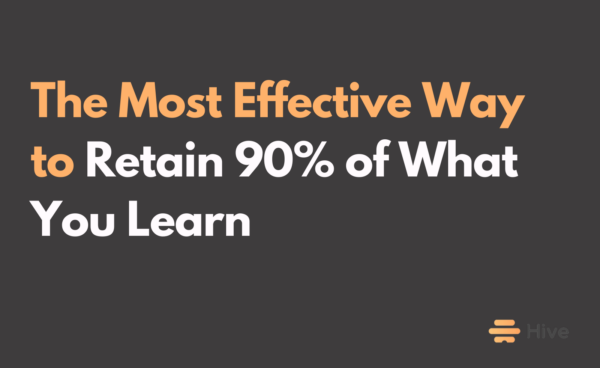When it comes to knowledge acquisition, faster isn’t always better. Learning in any environment is increasingly becoming faster — but we rarely stop to measure its effectiveness. Most people forget almost everything they learn. The average person only retains 10% of what they learn in one year.
Forgetting what you learn can lead to frustration and wasted time when you feel like you’re learning but not getting anywhere. There is no meaningful relationship between time and results when you hurry any learning process.
In his book, Thinking, Fast and Slow, Daniel Kahneman says, “Intelligence is not only the ability to reason; it is also the ability to find relevant material in memory.” What’s the point of learning if you can’t use it later in life or apply it when it matters most?
Learning and understanding are two different things. Many people confuse the two and think they need to be fast learners. If your aim is knowledge retention, it pays to slow down. In reality, slow learners have found that when they learn at a slower pace, they can retain information better. They think through ideas better, which enhances retention.
“Slowness of thought is not necessarily a handicap but could be a signature of optimal brain function,” according to research on The Rediscovery of Slowness. Learning slowly may actually be worth your time — if you slow down, you will retain more and enjoy the process of learning. I use slow learning to read great non-fiction books and learn new skills. I make notes, highlight ideas, underline important insights, and teach online what I learn.
Slow down to speed up understanding and retention
“He who learns but does not think is lost! He who thinks but does not learn is in great danger.” — Confucius
Slow-paced learning works better with self-paced learning — defining and using your own learning style is the best way for your brain to absorb new information faster. Learning is often thought of as a painful process where you have to put in long hours and struggle. The good news is, you change that.
Learning at your own pace can be the key to success if you can do it successfully. In our information-rich world, learning to slow down can help you learn more from great minds and about yourself, your abilities, and what you need to succeed. When you slow down to read a book or learn something new, you rarely miss valuable knowledge. Slow learners rarely repeat the process several times in the future. Your learning is likely to lead to mastery if you learn to slow down.
Information overload leads to cognitive stress, which decreases your ability to retain new knowledge. The human brain’s optimal concentration level is about 25 minutes — after that, without better breaks, you are likely to forget almost everything you learn. When you slow down, you give yourself enough time to make better connections for faster retrieval later.
“..slowing down the pace, even for a few minutes a day, and giving yourself time, decreases the emotional tension and, consequently, improves the “performance”, whether for study or work,” writes Valentina Tobia, a psychologist, with a PhD in Experimental Psychology, Linguistics and Cognitive Neuroscience.
There’s a time and place for fast learning — when you need to apply knowledge quickly to solve a problem in real-time: it’s called just-in-time learning.
Cramming or skimming doesn’t work if your long-term goal is knowledge retention. In desperation to pick up ideas quickly, you are likely to miss out on valuable ideas.
“Anything worth doing is worth doing slowly,” says Mae West.
Try the slow and short-burst approach if you want to become wiser over time. Take your time, take notes and allow your brain to accumulate wisdom slowly. Done effectively, slow learning can help you focus better, understand more and stack knowledge for life. It’s a better approach to move knowledge from your working memory to your long-term memory bank.
Over the long term, slow learners retain more than faster learners. So, next time, you learn something new, remember taking your time is the most effective approach to mastery.
This article originally appeared in Medium.




